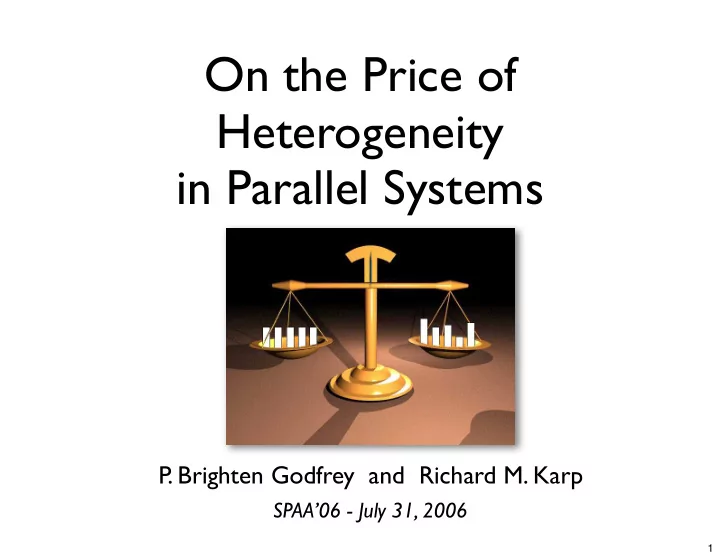

On the Price of Heterogeneity in Parallel Systems P . Brighten Godfrey and Richard M. Karp SPAA’06 - July 31, 2006 1
Introduction • Consider a parallel system in which processing speed, Bottleneck bandwidth to each node has a capacity Internet, memory, ... • Does increasing heterogeneity of the capacity distribution help or hurt? 2
Introduction System B System A Same total capacity; All nodes have higher variance equal capacity Does A or B perform better? ...can do either, depending on what Yes system we’re talking about AND the conditions under which we’re running the system 3
Example Minimum Makespan Scheduling • Set of jobs, each with a length • n processors, each with speed c i • Assign jobs to processors to minimize makespan : time until last processor completes its jobs • Completion time of processor i : sum of job lengths given to it, divided by c i 4
Example 1 Job lengths Processor speeds C Processor speeds C’ Completion time Completion time 4 sec 2 sec 5
Example 2 Job lengths Processor speeds C Processor speeds C’ Completion time Completion time 1 sec ≈ 2 sec 6
So increasing heterogeneity can help or hurt. Can we make any generalizations? 7
In This Paper a general framework to quantify the worst-case effect of increasing heterogeneity 8
Contents • Model • Results • Conclusion 9
Model g usually optimal Price of Heterogeneity of g value to some combinatorial optimization problem. g ( C ′ , W ) sup g ( C, W ) W,C,C ′ : C � C ′ cost function node capacities workload (processing time (CPU speed) (jobs to run) in optimal schedule) 10
Defining Heterogeneity • Capacity vectors C = ( c 1 , . . . , c n ) (sorted decreasing) C ′ = ( c ′ 1 , . . . , c ′ n ) • when C ′ � C k k n n � � � � c ′ c ′ ∀ k i ≥ c i and i = c i i =1 i =1 i =1 i =1 • Majorization partial order So majorization � var( C ′ ) ≥ var( C ) is consistent C ′ � C = ⇒ with both − H ( C ′ ) ≥ − H ( C ) variance and negative entropy. 11
Majorization example Most (4, 0, 0, 0) Serial Heterogeneous (3.8, .1, .1, 0) (2, 2, 0, 0) (1.5, 1.5, 1, 0) ( 4 / 3 , 4 / 3 , 4 / 3 , 0) Most Homogeneous (1, 1, 1, 1) Parallel 12
So Price of Heterogeneity also bounds the the Value of Parallelism! 13
Using the Price of Heterogeneity • Justified generalizations (Constant vs. unbounded PoH) • Comparison across systems What characteristics place a cost function in one or • Worst cases for testing the other category? 14
Contents • Model • Results • Conclusion 15
Results Problem PoH Minimum makespan scheduling 2-1/ n Scheduling on related machines O (1) PCS, unit length jobs ≤ 16 Precedence Constrained Sched. O (log n ) Sched. with release times Unbounded Minimum network diameter ≤ 2 16
One way to bound PoH • Goal: show C’ is as good as more homogeneous capacities C C C’ • Total capacity “simulated” by each C’ node must be not much more than its own capacity 17
Simulation Lemma • A ß -simulation is a mapping from C to C’ such that no C’ -node gets more than ß times its capacity. • Lemma: a (2-1/ n )-simulation always exists for any C and more heterogeneous C’ 18
Lay of the land • Minimum Makespan Scheduling & a class of generalizations: O (1) PoH • Precedence Constrained Scheduling (PCS): O (log n ) PoH • Scheduling with release times: unbounded PoH 19
PCS • Like Min. Makespan Scheduling, except... • Given set of precedence constraints: “Job i must finish before job k starts” 20
PCS • Simulation technique cannot succeed C -machines Time 1 2 3 ... ... • Design capacity distributions such that some C’ -machines simulate multiple C -machines • Factor n /4 increase in schedule length! 21
PCS • Instead, use LP relaxation of PCS due to Chudak and Shmoys • Can apply Simulation Lemma to optimal values of the LP • Key relaxed constraint: machine can only execute one job at a time • LP is within O (log n ) of optimal => PoH of PCS is O (log n ) 22
Contents • Model • Results • Conclusion 23
Conclusion • Introduced a framework to characterize worst-case effect of increasing heterogeneity • “Batch” scheduling problems have low PoH • Even PCS has O (log n ) PoH, while release times cause unbounded PoH • Does PCS have O (1) PoH? 24
Recommend
More recommend